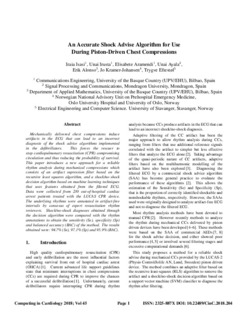
Título
An Accurate Shock Advise Algorithm for Use During Piston-Driven Chest CompressionsAutor-a
Autor-a (de otra institución)
Fecha de publicación
2018Otras instituciones
Universidad del País Vasco/Euskal Herriko Unibertsitatea (UPV/EHU)Oslo University Hospital
University of Stavanger
Versión
Version publicadaTipo de documento
Contribución a congresoContribución a congresoIdioma
InglésDerechos
© 2018 The AuthorsAcceso
Acceso abiertoVersión de la editorial
http://dx.doi.org/10.22489/CinC.2018.204Publicado en
Computing in Cardiology Conference (CinC). Maastricht, Netherlands Vol.45, 23-26 September. IEEE, 2018Editorial
IEEEPalabras clave
Cardiopulmonary ResuscitationThorax
Compression depth
Resumen
Mechanically delivered chest compressions induce artifacts in the ECG that can lead to an incorrect diagnosis of the shock advice algorithms implemented in the defibrillators. This forces the rescuer ... [+]
Mechanically delivered chest compressions induce artifacts in the ECG that can lead to an incorrect diagnosis of the shock advice algorithms implemented in the defibrillators. This forces the rescuer to stop cardiopulmonary resuscitation (CPR) compromising circulation and thus reducing the probability of survival. This paper introduces a new approach for a reliable rhythm analysis during mechanical compressions which consists of an artifact supression filter based on the recursive least squares algorithm, and a shock/no-shock decision algorithm based on machine learning techniques that uses features obtained from the filtered ECG. Data were collected from 230 out-of-hospital cardiac arrest patients treated with the LUCAS CPR device. The underlying rhythms were annotated in artifact-free intervals by consesus of expert resuscitation rhythm reviewers. Shock/no-shock diagnoses obtained through the decision algorithm were compared with the rhythm annotations to obtain the sensitivity (Se), specificity (Sp) and balanced accuracy (BAC) of the method. The results obtained were: 94.7% (Se), 97.1% (Sp) and 95.9% (BAC). [-]
Colecciones
El ítem tiene asociados los siguientes ficheros de licencia:





















